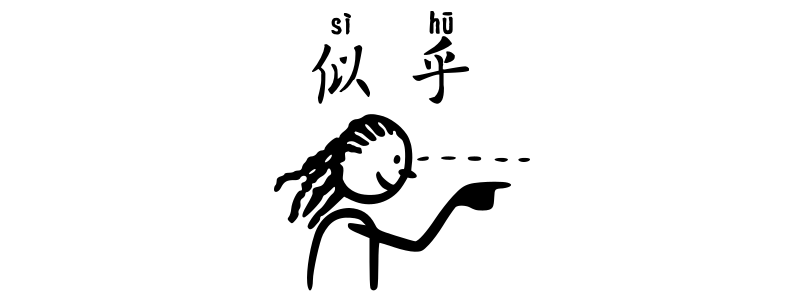Grammar Point:
The Chinese word 似乎 sìhū is similar to saying “seems like” or “seems” in English. It helps describe when something appears a certain way based on what you see or feel, but it’s not confirmed or certain.
Structure
S + 似乎 sìhū + Description/Action/Verb Phrase
似乎 sìhū is actually the formal term for 好像 hǎoxiàng in Chinese.
你似乎很緊張你似乎很紧张
You seem quite nervous.
那個人似乎不知道要怎麼開始那个人似乎不知道要怎么开始
That person seems unsure how to start.
他似乎沒有多餘的錢來買奢侈品他似乎没有多余的钱来买奢侈品
He seems to lack extra money to buy luxury items.
那隻貓似乎想表達什麼那只猫似乎想表达什么
It seems like that cat wants to tell me something.
經過了這些年,我似乎了解了這世上沒有所謂的正義经过了这些年,我似乎了解了这世上没有所谓的正义
Over these years, I seem to have understood that there’s no such thing as justice in this world.
那個男人似乎對你有意思那个男人似乎对你有意思
That man seems to be interested in you.
FYI
In Taiwan, there’s a unique behavior that indicates someone’s interest in you: buying or making breakfast for you. Compared to other countries, Taiwanese people tend to take breakfast more seriously. We believe a good breakfast sets you up for the day. If someone regularly prepares breakfast for you, it’s a sign they’re interested in you.
Comparison Chart
| 好像 hǎoxiàng (HSK 2) | seems like | More casual, everyday speaking |
| 似乎 sìhū (HSK 4) | it seems; it appears | Formal, often used in writing, logical tone, polite speech |
| 仿佛 fǎngfú (HSK 6) | as if | More emotional or poetic, often for descriptions |
他今天好像心情不好他今天好像心情不好
He seems to be in a bad mood today.
外面似乎要下雨了,天色變得很暗外面似乎要下雨了,天色变得很暗
It seems like it is going to rain outside; the sky is getting very dark.
夕陽下的大地彷彿披上了一層金色的紗衣夕阳下的大地仿佛披上了一层金色的纱衣
Under the sunset, the earth seemed to be covered with a golden veil.
Practice
TouchHover over the space to see the answers.
✔️It seems like you still don’t know what you did wrong.
你似乎還不知道自己做錯了什麼你似乎还不知道自己做错了什么
✔️ Your dog seems sick; you should take him to the vet soon.
你的狗似乎病了,你快帶他去看醫生吧你的狗似乎病了,你快带他去看医生吧
✔️ Chinese doesn’t seem as difficult as I imagined.
中文似乎沒有我想像中的那麼難中文似乎没有我想像中的那么难


